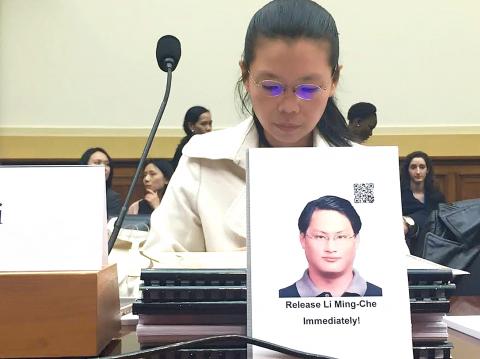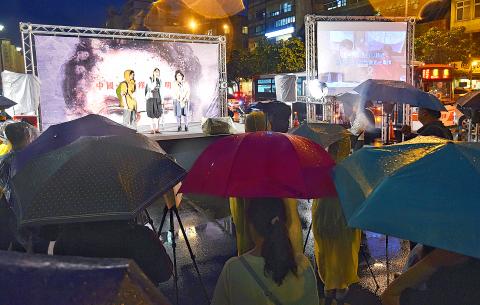Human rights groups yesterday gathered at the Liberty Square in Taipei, demanding that China immediately release Taiwanese human rights advocate Lee Ming-che (李明哲).
Lee was detained after entering Zhuhai City via Macau on March 19. He used to work for the Democratic Progressive Party and is currently a staff member at Wenshan Community College in Taipei, as well as a volunteer at the non-governmental organization Covenant Watch.
“We hope he will return soon,” Taipei Wenshan Community College president Cheng Hsiu-chuan (鄭秀娟) said.

Photo: courtesy of Shih Mi-na
The rally last night also sought to raise public awareness about forced disappearances.
“Lee’s wife, Lee Ching-yu [李凈瑜], declined the offer of help from human rights lawyers, because she believes her husband’s forced disappearance is an issue of human rights rather than a legal issue,” Cheng said. “There cannot not be any gray area between the two.”
Cheng said that people often joke that China has “held many Taiwanese hostages,” because of the large number of Taiwanese conducting business there, but she believes the nation would find a way to resolve the case without sacrificing its dignity.

Photo: Liu Hsin-de, Taipei Times
Taiwan Association for Human Rights secretary-general Chiu Ee-ling (邱伊翎) said that Beijing should clarify on what grounds it detained Lee Ming-che.
Even if China arrested Lee Ming-che according to the Law of the People’s Republic of China on the Administration of Activities of Overseas Non-Governmental Organizations within the Territory of China, Chinese authorities should not have detained him for more than 37 days, Chiu said.
Lee Ming-che had been detained for 61 days as of yesterday.
The 5 million Taiwanese visiting China each year must not turn a blind eye to the incident; otherwise, they would be acquiescing to China’s atrocities, which have not only infringed on the freedom of Taiwanese, but of international human rights advocates and academics, she added.
Covenant Watch chief executive officer Huang Yi-bee (黃怡碧) said her organization has sent a letter to German international law expert Eibe Riedel, who serves as a consultant for the German Commission for UNESCO, informing him of Lee Ming-che’s situation.
Riedel has forwarded the letter to the commission and 40 UNESCO ambassadors, Huang said, expressing the hope that UNESCO would use its influence to press China to release Lee Ming-che.
Meanwhile, Lee Ching-yu appeared on Thursday before a US House of Representatives committee hearing in Washington to appeal for help to secure her husband’s release.
She also pleaded for Washington to help preserve and enhance the human rights of Taiwanese in accordance with the Taiwan Relations Act (TRA).
Lee Ching-yu attended the hearing on forced disappearance, detention and torture in China along with the wives of three Chinese human rights lawyers who have also been detained.
Lee Ching-yu said in a statement that she had no choice but to seek help from the US, a country she described as “the leading democracy in the free world.”
“The US Congress has also voluntarily taken on the responsibility, as specified in section 2, clause 3 of the Taiwan Relations Act, to preserve and enhance the human rights of the people of Taiwan,” she said.
“Therefore, I stand alone before you today to plead for your help for my husband,” she said.
US Representative Chris Smith, who chaired the hearing of the subcommittee on global human rights, said Taiwan is an important democratic ally of the US, and a beacon of peace and democracy in Asia.
The US should continue its promises stated in the TRA and “six assurances,” which are the fundamental basis of Taiwan-US relations, he said.
After the hearing, Lee Ching-yu told reporters that she did not expect her husband to be released because of the hearing, but that being a human rights worker, one must believe in certain values and work hard to see them realized.
She said that as long as her husband remains in detention, she would do everything in her power to secure his release.

Taiwanese actress Barbie Hsu (徐熙媛) has died of pneumonia at the age of 48 while on a trip to Japan, where she contracted influenza during the Lunar New Year holiday, her sister confirmed today through an agent. "Our whole family came to Japan for a trip, and my dearest and most kindhearted sister Barbie Hsu died of influenza-induced pneumonia and unfortunately left us," Hsu's sister and talk show hostess Dee Hsu (徐熙娣) said. "I was grateful to be her sister in this life and that we got to care for and spend time with each other. I will always be grateful to

UNITED: The premier said Trump’s tariff comments provided a great opportunity for the private and public sectors to come together to maintain the nation’s chip advantage The government is considering ways to assist the nation’s semiconductor industry or hosting collaborative projects with the private sector after US President Donald Trump threatened to impose a 100 percent tariff on chips exported to the US, Premier Cho Jung-tai (卓榮泰) said yesterday. Trump on Monday told Republican members of the US Congress about plans to impose sweeping tariffs on semiconductors, steel, aluminum, copper and pharmaceuticals “in the very near future.” “It’s time for the United States to return to the system that made us richer and more powerful than ever before,” Trump said at the Republican Issues Conference in Miami, Florida. “They

REMINDER: Of the 6.78 million doses of flu vaccine Taiwan purchased for this flu season, about 200,000 are still available, an official said, following Big S’ death As news broke of the death of Taiwanese actress and singer Barbie Hsu (徐熙媛), also known as Big S (大S), from severe flu complications, the Centers for Disease Control (CDC) and doctors yesterday urged people at high risk to get vaccinated and be alert to signs of severe illness. Hsu’s family yesterday confirmed that the actress died on a family holiday in Japan due to pneumonia during the Lunar New Year holiday. CDC Deputy Director-General Tseng Shu-hui (曾淑慧) told an impromptu news conference that hospital visits for flu-like illnesses from Jan. 19 to Jan. 25 reached 162,352 — the highest

TAIWAN DEFENSE: The initiative would involve integrating various systems in a fast-paced manner through the use of common software to obstruct a Chinese invasion The first tranche of the US Navy’s “Replicator” initiative aimed at obstructing a Chinese invasion of Taiwan would be ready by August, a US Naval Institute (USNI) News report on Tuesday said. The initiative is part of a larger defense strategy for Taiwan, and would involve launching thousands of uncrewed submarines, surface vessels and aerial vehicles around Taiwan to buy the nation and its partners time to assemble a response. The plan was first made public by the Washington Post in June last year, when it cited comments by US Indo-Pacific Commander Admiral Samuel Paparo on the sidelines of the Shangri-La Dialogue